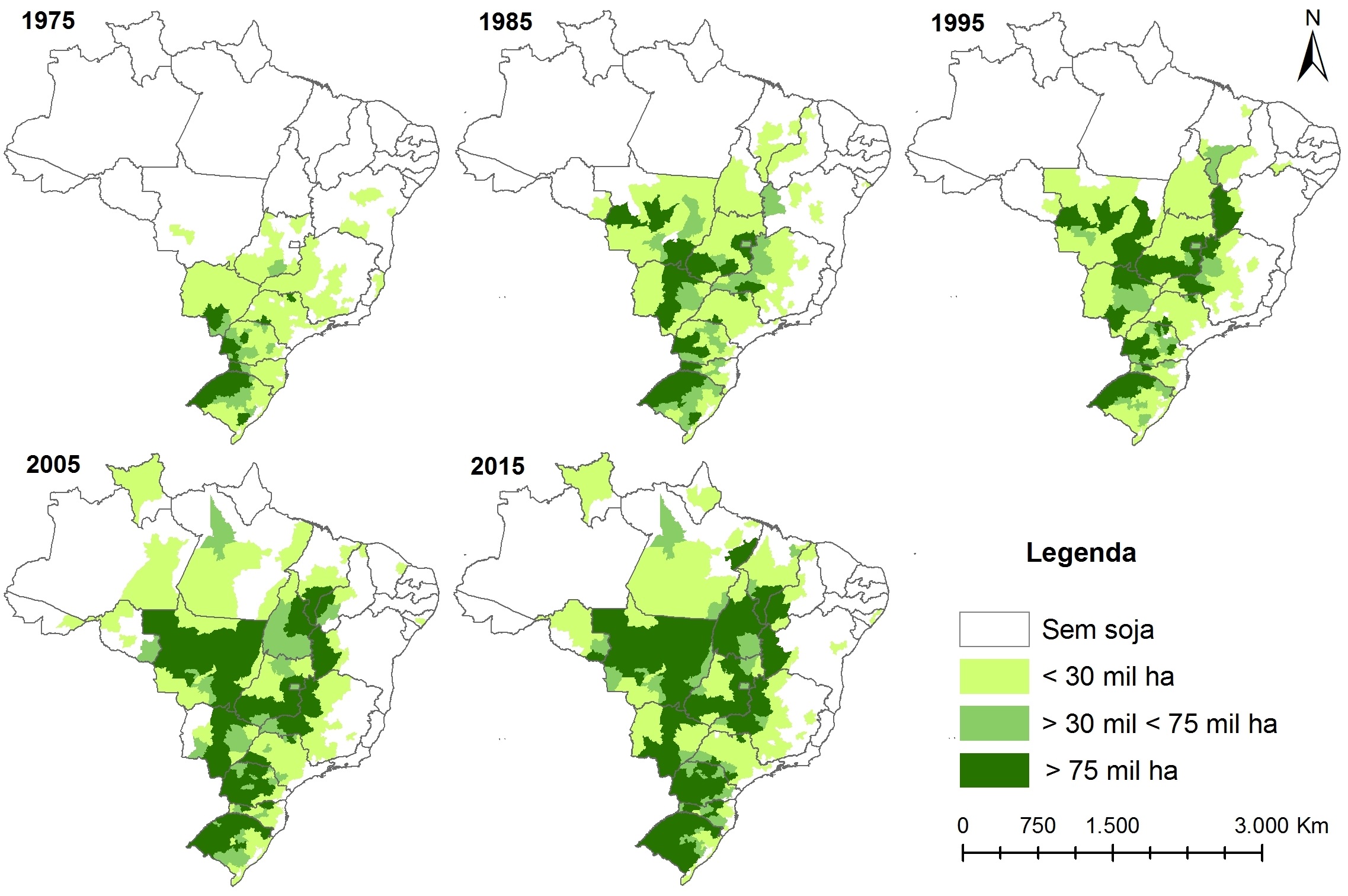| 2011 |
China National Agriculture Development Group Corporation (CNADC) |
Governo de Goiás |
anunciado |
GO |
7 bi |
Participação em projetos de expansão do cultivo de grãos e construção da linha ferroviária Norte-Sul em Goiás. Uma área de 2,4 milhões de hectares para a produção de soja e sua exportação para a China |
Greenfield |
Estatal Central |
Busca de recursos |
| 2011 |
Chongqing Grain Group (CQGG) |
N/A |
anunciado |
BA |
300 mi |
Compra de 100 mil ha para a produção de soja; instalação de uma planta de esmagamento; investimento parou devido às restrições governamentais às compras de terras por estrangeiros |
Greenfield |
Estatal Provincial |
Busca de recursos |
| 2011 |
Anhui Longping High-Tech Seeds |
Não decidido |
N/A |
N/A |
N/A |
Fornecer genética de sementes de arroz ao parceiro local, que as multiplica e comercializa pagando royalties; ou criar uma joint venture, com os termos a serem discutidos no futuro |
Parceria estratégica |
Privada |
Busca de competências/ mercados |
| 2011 |
COFCO Ltd. |
Companhia Nacional de Açucar e Alcool (CNAA) |
anunciado |
GO, MG |
N/A |
Compra de duas plantas da CNAA |
F&A |
Estatal Central |
Busca de recursos |
| 2011 |
Grupo Pallas International (GPI) |
Governo da Bahia |
anunciado |
BA |
N/A |
Compra de terra para produção de soja e bionergia para exportação à China |
Greenfield |
Privada |
Busca de recursos |
| 2012 |
Universal Timber |
N/A |
anunciado |
AC |
20 mi |
Projeto de manejo florestal nos municípios de Madureira e Feijó |
Greenfield |
Privada |
Busca de recursos |
| 2013 |
BBCA |
N/A |
confirmado |
MS |
320 mi |
Construção de uma unidade de processamento com capacidade para 1.200.000 toneladas de grãos em Maracajú |
Greenfield |
Estatal Central |
Busca de recursos |
| 2014 |
Tide Group |
Prentiss Química |
confirmado |
PR |
N/A |
Restaurar a capacidade produtiva da Prentiss e investir na pesquisa e desenvolvimento de agroquímicos |
F&A (parcial) |
Privada |
Busca de competências/ recursos |
| 2014 |
China Tobacco International do Brasil (CTIB) |
China Brasil Tabacos Exportadora (CBT) |
confirmado |
RS |
20 mi |
Produção de tabaco e construção de fábricas, armazéns e escritórios em Santa Cruz do Sul e Venâncio Aires |
Joint Venture |
Estatal Central |
Busca de recursos |
| 2014 |
ChemChina |
Adama Brasil |
confirmado |
PR, RS |
N/A |
29 pesticidas genéricos em desenvolvimento, ativos e pessoal |
Aquisição |
Estatal Central |
Busca de competências |
| 2014 |
COFCO Ltd. |
Nidera Agri |
confirmado |
RS, PR, MT, SC, SP,MG, GO, BA, DF |
1,2 bi |
Originação, processamento e comercialização de soja e milho, distribuição de insumos, infra-estruturas e serviços de armazenamento, transporte e logística |
F&A |
Estatal Central |
Busca de competências/ recursos |
| 2014 |
COFCO Ltd. |
Noble |
confirmado |
BA, MT, MG, SP, PR |
1,5 bi |
Originação, processamento e comercialização de soja e milho, distribuição de insumos, infra-estruturas e serviços de armazenamento, transporte e logística |
F&A |
Estatal Central |
Busca de competências/ recursos |
| 2016 |
Hunan Dakang Pasture Farming Co/Pengxin |
Fiagril |
confirmado |
MT, AP, TO, PA |
200 mi |
Originação, processamento e comercialização de soja e milho, distribuição de insumos, infra-estruturas e serviços de armazenamento, transporte e logística |
F&A (parcial) |
Privada |
Busca de competências/ recursos |
| 2017 |
DKBA/Pengxin |
Belagrícola |
confirmado |
PR, SC, SP |
N/A |
Originação, processamento e comercialização de soja e milho, distribuição de insumos, infra-estruturas e serviços de armazenamento, transporte e logística |
Aquisição |
Privada |
Busca de competências/ recursos |
| 2017 |
CITIC Ltd. |
Dow Sementes do Brasil |
confirmado |
N/A |
1.1 bi |
Centros de pesquisa, plantas de processamento de sementes e banco de geoplasma de milho, licenças para o uso de marcas Morgan e Dow Seeds |
Aquisição |
Privada/Apoiada Estado |
Busca de competências |

 Thumbnail
Thumbnail
 Thumbnail
Thumbnail
 Thumbnail
Thumbnail
 Fonte: Elaborado por Valdemar J. Wesz Jr. com dados do IBGE. Apoio Grupo de Estudos sobre Mudanças Sociais, Agronegócio e Políticas Públicas.
Fonte: Elaborado por Valdemar J. Wesz Jr. com dados do IBGE. Apoio Grupo de Estudos sobre Mudanças Sociais, Agronegócio e Políticas Públicas.
 Fonte:
Fonte:  Fonte: Brasil (
Fonte: Brasil (